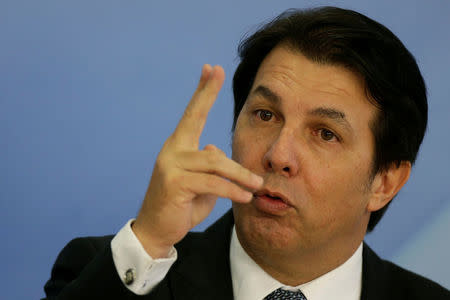Brazil waters down pension reform as protests turn violent
By Maria Carolina Marcello and Ueslei Marcelino BRASILIA (Reuters) - Brazil's President Michel Temer on Tuesday made new concessions to ease passage of an unpopular pension reform bill that has drawn angry demonstrations from labour organizations, including police unions that tried to invade Congress in protest. The watered-down proposal, which has faced pressure from skittish lawmakers, has raised doubts among investors about the full fiscal impact of a proposal aimed at narrowing a huge and growing budget deficit. After the details of the new proposal were revealed on Tuesday, protesting police unions clashed with congressional guards in riot gear, who used tear gas and stun grenades to disperse the demonstrators from the front doors of Congress. The protest underscored the unpopularity of a reform that is at the heart of Temer's austerity program, which aims to rescue the Brazilian economy from its deepest recession on record. Temer agreed to set a lower retirement age for women, police, teachers and rural workers and grant more generous transition rules for workers after allies' concerns delayed the bill's formal presentation in Congress until Wednesday. Finance Minister Henrique Meirelles told Reuters in an interview that the changes will reduce government savings from the reform by 20 percent to 25 percent in the next 10 years and by nearly 30 percent over a 30-year horizon. Meirelles said changes to the original bill were within the government's expectations, and he did not expect further modifications as the proposal makes its way through Congress. Still, some analysts have a dimmer outlook. In a note to clients, JP Morgan analysts said the changes could mean savings of just 472 billion reais, down from 781 billion originally - a 40 percent drop. Pension reform is a contentious issue in Brazil, where the average retirement age is 54 years old in what is considered one of the world's most generous social security systems. Investor concerns over potential delays to the reform have weighed on demand for Brazilian assets in recent days. The country's benchmark Bovespa stock index slipped 0.3 percent on Tuesday, falling for the fourth time in five sessions, and the real reversed early gains. The reform needs to be approved by a congressional committee before a floor vote in the full chamber. As it is a constitutional amendment, the measure has to be approved by a three-fifths majority in two separate votes by both the lower house and the Senate. (Reporting and writing by Alonso Soto; Editing by Brad Haynes and Cynthia Osterman)

 Yahoo News
Yahoo News 

